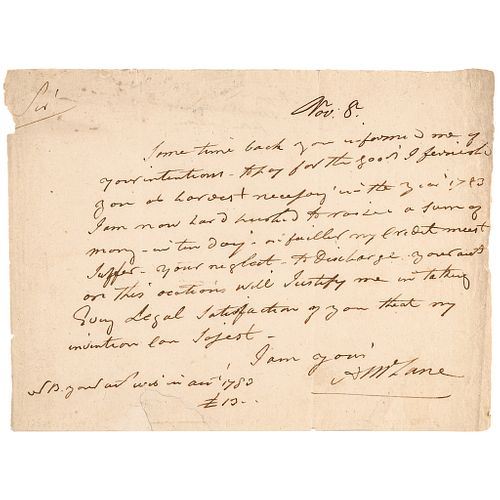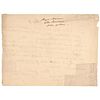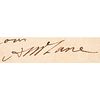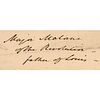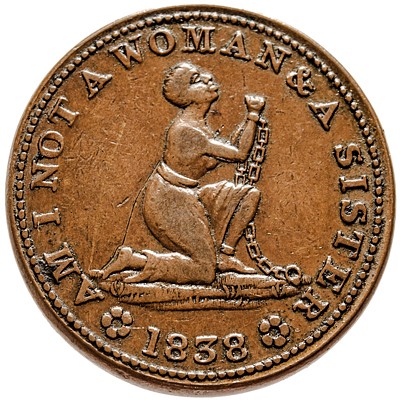George Washington - Personal Spy ALLAN McLANE Continental Army Officer 1783 ADS
Lot 291
Categories
Estimate:
$1,200 - $1,800
Absentee vs Live bid
Two ways to bid:
- Leave a max absentee bid and the platform will bid on your behalf up to your maximum bid during the live auction.
- Bid live during the auction and your bids will be submitted real-time to the auctioneer.
Bid Increments
| Price | Bid Increment |
|---|---|
| $0 | $10 |
| $200 | $20 |
| $300 | $25 |
| $500 | $50 |
| $1,000 | $100 |
| $2,000 | $200 |
| $3,000 | $250 |
| $5,000 | $500 |
| $10,000 | $1,000 |
| $20,000 | $2,000 |
| $30,000 | $2,500 |
| $50,000 | $5,000 |
| $100,000 | $10,000 |
| $200,000 | $20,000 |
| $300,000 | $25,000 |
| $500,000 | $50,000 |
About Auction
By Early American History Auctions
Feb 27, 2021
Set Reminder
2021-02-27 12:00:00
2021-02-27 12:00:00
America/New_York
Bidsquare
Bidsquare : Black History & Slavery, Historic Autographs, Colonial America & Weapons
https://www.bidsquare.com/auctions/early-american-history-auctions/black-history-slavery-historic-autographs-colonial-america-weapons-6434
318 Lots of Rare, Historic Autographs, Americana, Civil War Era, George Washington, Abraham Lincoln, Slavery & Black History, Revolutionary War Era, Colonial America, Federal Period, War of 1812, Colonial Currency, Historic Early American Guns & more... Early American History Auctions auctions@earlyamerican.com
318 Lots of Rare, Historic Autographs, Americana, Civil War Era, George Washington, Abraham Lincoln, Slavery & Black History, Revolutionary War Era, Colonial America, Federal Period, War of 1812, Colonial Currency, Historic Early American Guns & more... Early American History Auctions auctions@earlyamerican.com
- Lot Description
American Revolution
ALLAN McLANE... George Washington's Personal Spy Continental Army Officer1783Autograph Document Signed
ALLAN McLANE (1746-1929). American Revolutionary War Continental Army Officer, Served at Camp Valley Forge, First United States Marshal of Delaware, Customs Collector of the Port of Wilmington, and General George Washington's Personal Spy, historic American Army Officer of extensive service.
November 8, 1783-Dated Revolutionary War Period, very rare handwritten Autograph Document boldly Signed, "A McLane," for a currently very urgent request for prompt payment, on goods supplied previously in 1783, 1 page, Choice Very Fine. Written in bold brown ink on fine laid period paper, measuring 6.25" x 8.25" with a small, expert repair to some paper loss on the bottom left edge selvage likely when opened, not affecting any text. It reads, in full:
"Sir -- Some time back you informed me of your intentions to pay for the goods I furnished you at harvest necessary in the year 1783. I am now hard pushed to raise a sum of money - in ten days or failled (sic) my credit must suffer. Your neglect to discharge your acct on this ocations (sic) will justify me in taking every legal satisfaction of you that my invention can sojest (sic) - I am yours, (Signed) A McLane --- P.S. your act was in acct. 1783 13".
In the Fall of 1781 General George Washington sent McLane to the New York City area to meet with a spy connected with the Culper Ring, the large and sophisticated American collection effort centered in the region. This was a very important agent, the Tory printer James Rivington, who had social and business access to senior British officials and military officers in the city. This Document accompanied by a reprinted copy of McLane's extensive service and personal history. McLane's signature measures 2.5" long with his flourish line below at the conclusion.
Allan McLane was born in Philadelphia in 1746 to Allan McLean or Maclean who had arrived in America from the Isle of Coll, Scotland, in 1738. His father was a merchant in Philadelphia and later Wilmington, DE. His upbringing was quite aristocratic since he was able to tour Europe and visiting relatives in Scotland in 1767-1769.
Allan himself settled near Smyrna in 1774 to begin a trading business. He changed his name to McLane in July of 1775 "to avoid confusion with that renegade Scot serving the Hanoverian King" he wrote! Around the same time, his father passed away, leaving the son with property valued at more than $15,000.
Allan fought as a volunteer at Great Bridge, VA in December of 1775, Norfolk in January of 1776 and served in Washington's army in New York under commission of September 11, 1775 as Lieutenant and Adjutant of Caesar Rodney's militia regiment. He captured a British patrol at Long Island on August 27, 1776.
He was involved at White Plains, Trenton and promoted for gallantry on January 3, 1777 at Princeton. A few days later he joined the "Additional Continental Regiments" with Col. John Patton. He saw action at Cooch's Bridge and Brandywine.
After Brandywine he was detached to raise a company of his own in Delaware.
Supposedly, he used his entire personal fortune to fund the equipage and payment of his regiment.
At Germantown, McLane served as the advance guard of the main column under the Commander in Chief. He was commissioned to screen the army as it prepared to make quarters for the winter at Valley Forge. December 3, 1777 he warned George Washington of a large scale party from Philadelphia which enable the successful defense of the men at White Marsh a few days later.
McLane and his men were so successful at Valley Forge in harassing the enemy convoys and foraging parties that they were given the nickname "market stoppers."
During the first couple of months in 1778, they gathered livestock from Delaware and Maryland for the troops at Valley Forge as well as Smallwood's troops located at Wilmington. McLane rejoined the army with about 100 to 150 mounted men - who were also supplemented on occasion by 50 Oneida Indians.
On May 19, 1778, as the Mischianza was ending up in Philadelphia, McLane's company, with support from a company of dragoons had red-eyed redcoats running to repel an fake attack simulated at the enemy's outpost. The men were dropping iron pots full of gunpowder and scrap metal from their galloping steeds along the line of the British outposts. His scouts aided in detecting the British "surprise" at Barren Hill with Lafayette. He narrowly escaped and ambush on June 8, and may even be the first American to enter Philadelphia after the evacuation of the British on the 18th.
McLane was very wary of Benedict Arnold's loyalties and he went to Washington to inform him of some of his profiteering soon after Arnold took command of Philadelphia. Arnold's treason actually occurred a year later, so he may have been a bit premature - although instinctive. Washington gave McLane a stinging rebuke for his pains nonetheless.
At Monmouth, McLane and his company operated with Dickinson's militia. In later reorganization McLane's command was made a part of the Delaware Regiment December 16 and by July 13 1779 he was attached to the "Partisan Corps" under Henry Lee.
He was heavily involved with action at Stony Point and later Paulus Hook. Lee and McLane developed difficulties in working together, so Washington solved the tension by sending McLane to reinforce Lincoln down in Charleston, South Carolina. He just missed being captured when the city was taken, and fell under the command of von Stueben instead. There he was promoted to Major.
After returning north, he left Philadelphia in 1781 to accompany messages for the Comte de Grasse to leave the West Indies to support Washington and Rochembeau. The return voyage found McLane in command of the privateer "Congress."
They captured the sloop, the "Savage." His commission during the Yorktown Campaign was to scout New York City from Long Island and keep the Commander in Chief informed on whether the British were detaching troops to aid Cornwallis in the south. McLane left the army on December 31, 1781. Some records are confused as to his rank and retirement.
McLane had given away his personal fortune. He entered a mercantile business venture with Robert Morris. In 1789 he was appointed a marshal of Delaware and became a collector for the port of Delaware in 1797. He held that post until his death in 1829. He was politically active in Delaware. During the War of 1812, and at the age of 68, he commanded the defenses of Wilmington.
McLane served in the Continental Army during the Revolutionary War. In 1775, he was a volunteer in the Battle of Great Bridge near Norfolk, Virginia, where the Virginia militia repelled a British assault. He was one of the first American officers to suspect Benedict Arnold's loyalty. He joined Caesar Rodney's Delaware regiment as a lieutenant, and fought at the battles of Long Island, White Plains, Princeton, and Monmouth.
He used most of the fortune he inherited after his father died to fund his own company, providing payment and equipment for the troops. During the Philadelphia campaign, according to historian Christopher Ward:
He was Captain of an Independent Corps, now a small group of horsemen, now a hundred men, mounted and on foot, including sometimes a contingent of Oneida Indians, he was at once forager, scout, and raider everywhere about Philadelphia and even, at times, in that city in disguise.
In July 1779, McLane and his company were annexed to Lee's Legion, with McLane to command the infantry. McLane served under the command of Major "Light-Horse Harry" Lee at the Battles of Stony Point and Paulus Hook, but tensions between McLane and Lee ultimately caused Washington to send McLane and his company to Charleston, South Carolina to reinforce General Benjamin Lincoln.
After the British captured Charleston in March 1780, McLane came under the command of Baron von Steuben, who was then assisting General Nathanael Greene in the Southern campaign. He returned north, and was breveted to the rank of major in 1781.
Painting of American privateer Congress capturing HMS Savage In June 1781, McLane took ship on the American privateer Congress to carry dispatches from George Washington to Count Paul de Grasse, who was at Cap-Franois, Haiti, commanding a French fleet. After convincing de Grasse to bring his fleet to Chesapeake Bay, McLane returned to New Jersey in September 1781. Along the way, he commanded the Congress's Marines during the capture of HMS Savage, a British sloop-of-war.
McLane continued to serve through the Yorktown campaign, scouting the movement of British troops southward from New York City, and capturing British private naval signals.He left the army at the end of 1781.
McLane's intelligence activities were both overt and covert. His unit's military role to scout British defensive positions and remain alert to any British offensive movement represented his overt role. It also provided cover for his debriefing of human sources to report on British activities. In a letter from Washington to McLane dated March 28, 1777, he was told "... I therefore depend upon your keeping a very good look out upon their line, and gaining every intelligence from people coming out of town"
McLane was involved, as a soldier, an intelligence officer and a spy, in two battles, Stony Point and Paulus Hook. At Stony Point in July 1779, Washington ordered Gen. Anthony Wayne to attack the British position on the west side of the Hudson River. As the British post appeared to be well defended, Washington suggested Wayne conduct a detailed reconnaissance of the position with the help of Continental engineering officers. He further suggested that even better intelligence could be obtained if a man could be sent into the position to personally observe the force and its situation. McLane agreed to play the role of a rather simple-minded relative of a local woman who had been given permission to visit Stony Point to see her son, who had recently defected to the British from a local militia unit. While the mother spoke with her son, McLane wandered about the post, noting defensive positions, numbers of troops and the garrison's security procedures at night.
When he returned to Wayne's headquarters, the general combined McLane's information with the engineering officers' observations of the terrain and defensive works, and formulated a plan for a night bayonet assault by way of a shallow area of the river. The surprise attack was successful, resulting in the capture of most of the British garrison with only a few American causalities.
In the Fall of 1781, General George Washington sent McLane to the New York City area to meet with a spy connected with the Culper Ring, the large and sophisticated American collection effort centered in the region. This was a very important agent, the Tory printer James Rivington, who had social and business access to senior British officials and military officers in the city.
Our Auction Contents:
Black History & Slavery: (Lots 1 - 63)
Abraham Lincoln Related: (Lots 64 - 74)
Historic Autographs: (Lots 75 - 235)
Colonial America: (Lots 236 - 261)
Revolutionary War: (Lots 262 - 304)
George Washington Related: (Lots 305 - 306)
Early American Guns & Weapons: (Lots 307 - 318) - Shipping Info
-
Early American provides in-house worldwide shipping. Please contact us directly if you have questions about your specific shipping requirements.
-
- Buyer's Premium



 EUR
EUR CAD
CAD AUD
AUD GBP
GBP MXN
MXN HKD
HKD CNY
CNY MYR
MYR SEK
SEK SGD
SGD CHF
CHF THB
THB